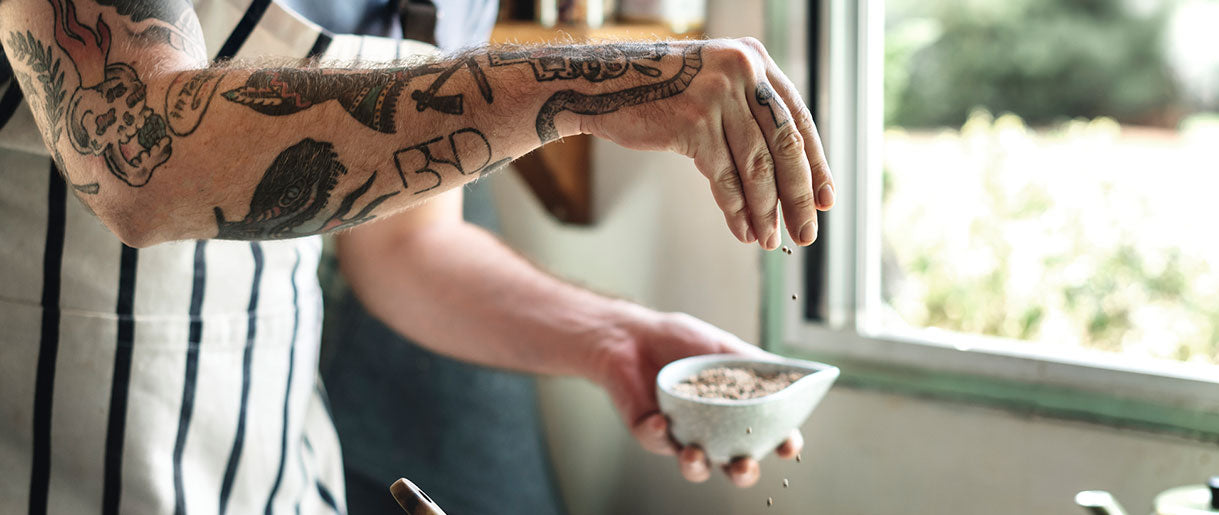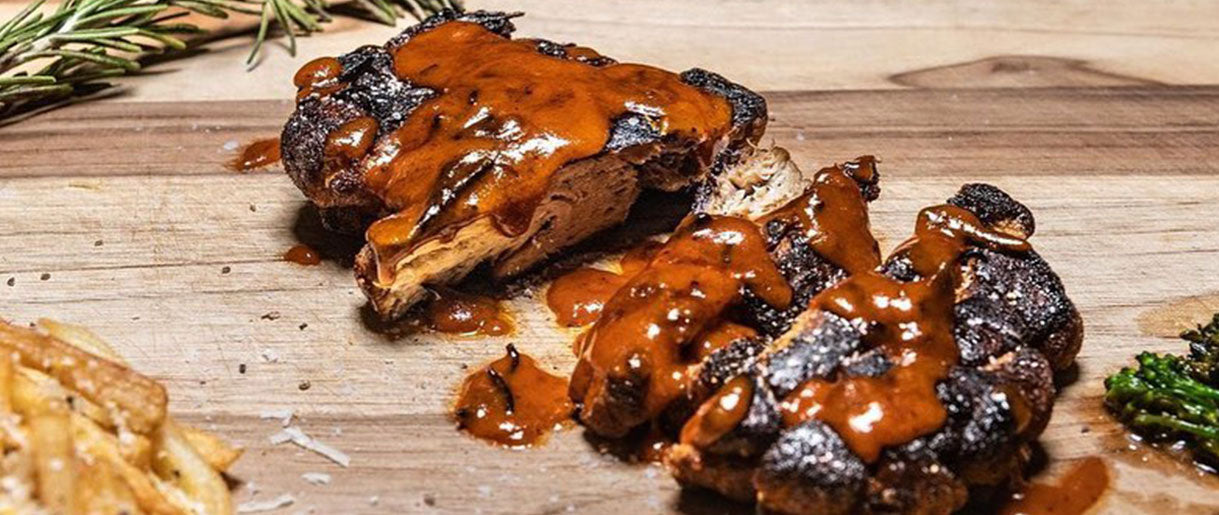Whether you cook for nutrition, love to cook, or are a novice in the kitchen, the aim for all of us is to make delicious and balanced meals. However, knowing how to enhance your meals to guarantee you're maximizing both nutrients and flavor might be challenging when there are so many conflicting views on the best diets and how to fuel your body.
Say hello to mushroom powder.
Mushroom extract powder for cooking is the “it” thing right now. It can be used instead of salt to provide a little more umami. In addition, you can make your own organic mushroom powder for cooking using dried mushrooms.
The mushroom powder seasoning can be used with an extra flavorful kick for any recipe. While this could give your food a little more depth of taste, you might want to look at pre-made mushroom powders to enhance the health benefits.
Read on to find the best mushroom powder for cooking that suits you.
What Is Mushroom Powder?

Simply speaking, mushroom powder is prepared by dehydrating and grinding it into a fine powder. Some are first processed with hot water or alcohol extraction to extract the beneficial components necessary to reap the full advantages. Some "mushroom powders" can be created from myceliated grain as well.
While you can make your own mushroom powder or buy it at your local health food store or Asian grocery store, it's important to note that not all mushroom powders are created equal.
Medicinal mushroom powders can be prepared from a single species or various mushrooms. In addition, they frequently contain a range of mushroom extracts to enhance the individual health advantages of each species.
Pre-made mushroom powders can provide particular health benefits dependent on your body's demands. Certain mushrooms (not the typical grocery store kinds) can be classified as superfoods or functional mushrooms.
Lion's Mane, Chaga, and Reishi are the most common of these superfood mushrooms. These mushroom types are becoming more popular in the Western world. Still, they have been consumed as tonifying or therapeutic foods in societies dating back to the 1700s B.C. in China during the Shang Dynasty.
Because these mushrooms can be more difficult to get your hands on, incorporating mushroom powder into your diet and reaping the health benefits that come with it is an easy way. This can be done using dried mushroom powder for cooking or incorporating it into a warm or cold beverage of your choice.
Flavor And Culinary Uses Of Mushroom Powder

One of the most common queries regarding mushroom powder is its flavor profile. Of course, eating mushrooms that have been breaded, pan-fried, or roasted in the oven is one thing. However, using powdered mushrooms in a smoothie or a cup of coffee?
That might not sound like something you would look forward to. While certain mushrooms are more potent than others—for example, Reishi can be bitter, and Cordyceps can be intense—many mushrooms, especially when powdered, impart a faint earthy flavor.
If you dislike earthy flavors, the good news is that mushroom powders complement a broad range of foods and beverages and quickly absorb the flavor of whatever you add them to. As a result, you can experience all of the benefits without experiencing any unpleasant aftertaste.
Cooking with mushroom powder
The possibilities for cooking with mushroom powders are almost unlimited, but here are a few suggestions to get you started:
- Add a few pinches to your next batch of granola, or scatter with vegetables just before roasting.
- Flavor soups, broths, curries, and stews with the powders.
- Make a dry rub for pork, chicken, or fish.
- Combine coarse salt, mushroom powder, and chopped herbs in a compound butter.
- Whisk a teaspoon or two into the dry ingredients for brownies or spice cookies.
One of our favorite ways to utilize the powder is to make mushroom salt, which adds umami to the finale of almost any savory dish. For example, we recommend using it to salt the rims of cocktail glasses for mushroom cocktails like Negronis, margaritas, and French 75s. It's another way to savor the world of taste contained within a few handfuls of mushrooms.
Nutritional Benefits Of Mushroom Powder
Aside from the flavor-enhancing properties of mushroom powders, the health benefits you receive will vary depending on the type of mushroom powder you use.
Chaga for immunity

Chaga mushrooms are most recognized for their immune-boosting properties, but they are also high in vitamins, which can provide additional health advantages. Nutritionally, Chaga is rich in antioxidants and numerous beneficial bioactive compounds such as melanins, flavans, triterpenoids, polyphenols, and polysaccharides.
Some research has looked into whether Chaga mushrooms can prevent or slow the growth of cancer(1). Chaga is chock full of antioxidants. These are substances that aid in the prevention of cell damage produced by free radicals or oxidants.
Chaga may aid in regulating cytokine synthesis(2), thereby aiding the immune system by allowing cells to communicate with one another. This could aid in the battle against infections ranging from simple colds to life-threatening diseases. In addition, Chaga's involvement in controlling cytokine production may potentially aid in inflammation control(3).
Lion’s mane, the brain food

We all know that Lion's Mane mushrooms promote brain health, but did you realize they may also help the neural, digestive, and other organs?
Research has shown that the shaggy-looking mushroom contains brain cells boosting compounds(4), erinacines, and hericenones.
Animal studies have also discovered that Lion's mane may help guard against Alzheimer's disease, a degenerative brain illness that causes progressive memory loss. A 2020 research of people with mild Alzheimer's disease discovered that taking 1 gram of Lion's mane mushroom(5) daily for 49 weeks improved cognitive test scores much more than a placebo.
Some of the therapeutic effects of Lion's mane mushroom on brain health may be explained by its ability to increase neuron growth and protect the brain from Alzheimer's-related damage.
Reishi for relaxation

Reishi mushrooms can help the mind and body relax and improve intestinal and skin health. In addition, Reishi mushrooms may benefit immunity and general health.
According to one study, Reishi(6) may boost the number of white blood cells in people with colon cancer. In another study, the fungus boosted lymphocyte function, which aids in the fight against infections and cancer, in athletes(7) exposed to stressful settings.
FAQs About Mushroom Powder For Cooking
Is There Any Side Effects Of Mushroom Powder?
Mushroom powders are usually safe at recommended dosages and when used to flavor cuisines. However, some people may experience mild side effects like digestive upset, rashes, and nausea.
Does Mushroom Powder Have A Taste?
Mushroom powders have a mild earthy taste. So if you’re not a fan of the flavor of mushrooms, powders may just be your thing.
Can Mushroom Powder Cause Bloating?
Mushroom extract is safe to consume. However, the additional polysaccharide intake may cause increased bloating, gas, or diarrhea in certain people.
Key Takeaways
Using mushroom powder for cooking is a fantastic way to add the health benefits of functional fungi into your wellness regime without compromising on the taste. Add it to smoothies, soups, or stews. You’ll be spoilt for choices.
References
- Continuous intake of the Chaga mushroom (Inonotus obliquus) aqueous extract suppresses cancer progression and maintains body temperature in mice, (1)https://www.ncbi.nlm.nih.gov/pmc/articles/PMC4946216/
- Immunomodulatory effects of Inonotus obliquus polysaccharide on splenic lymphocytes infected with Toxoplasma gondii via NF-κB and MAPKs pathways, (2)https://pubmed.ncbi.nlm.nih.gov/34918603/
- The pharmacological potential and possible molecular mechanisms of action of Inonotus obliquus from preclinical studies, (3)https://pubmed.ncbi.nlm.nih.gov/31209936/
- Lion’s Mane Mushroom, Hericium erinaceus (Bull.: Fr.) Pers. Suppresses H2O2-Induced Oxidative Damage and LPS-Induced Inflammation in HT22 Hippocampal Neurons and BV2 Microglia, (4)https://www.ncbi.nlm.nih.gov/pmc/articles/PMC6720269/
- Prevention of Early Alzheimer’s Disease by Erinacine A-Enriched Hericium erinaceus Mycelia Pilot Double-Blind Placebo-Controlled Study, (5)https://www.ncbi.nlm.nih.gov/pmc/articles/PMC7283924/
- Monitoring of immune responses to a herbal immuno-modulator in patients with advanced colorectal cancer, (6)https://pubmed.ncbi.nlm.nih.gov/16428086/
- Effect of Ganoderma lucidum capsules on T lymphocyte subsets in football players on "living high-training low, (7)https://pubmed.ncbi.nlm.nih.gov/18048435/








Let Us Know Your Comments